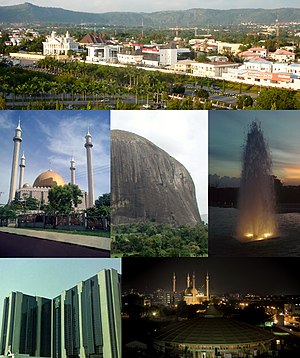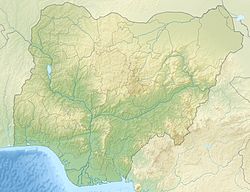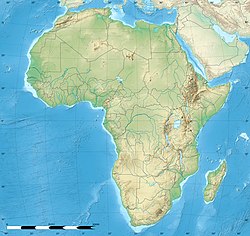
Back Abuja ACE Abuja Afrikaans አቡጃ Amharic Abuja AN Abūdga ANG أبوجا Arabic أبوجا ARY ابوجا ARZ Abuya AST Abuja AVK
Abuja | |
|---|---|
 From top (L–R): View of a street in Maitama, Abuja National Mosque, Zuma Rock, fountain in Millennium Park, Central Bank headquarters, and nighttime skyline of the Central Business District | |
| Nickname: ABJ | |
| Coordinates: 9°4′N 7°29′E / 9.067°N 7.483°E | |
| Country | Nigeria |
| Territory | Federal Capital |
| Settled | 1828 |
| Incorporated | 1 October 1984 |
| Declared capital | 12 December 1991 |
| Government | |
| • Type | City management |
| • Body | Abuja Metropolitan Management Council |
| • Minister of the Federal Capital Territory | Nyesom Wike |
| Area | |
| • Federal capital city and local government area | 1,476 km2 (570 sq mi) |
| • Urban | 927 km2 (358 sq mi) |
| Elevation | 360 m (1,180 ft) |
| Population (2022 estimate)[1] | |
| • Federal capital city and local government area | 1,693,400 |
| • Rank | 7th |
| • Density | 1,100/km2 (3,000/sq mi) |
| • Urban | 3,770,000[3] |
| • Urban density | 4,066/km2 (10,530/sq mi) |
| • Metro | 6,000,000 (estimated)[2] |
| Time zone | UTC+01:00 (WAT) |
| Postal codes | 900211–900288 |
| Climate | Aw |
| Website | fcta |
 | |
Abuja (/əˈbuːdʒə/)[4] is the capital and eighth most populous city of Nigeria.[5] Situated in the middle of the country within the Federal Capital Territory (FCT), it is a planned city built mainly in the 1980s based on a master plan by International Planning Associates (IPA),[6][7][8] a consortium of three American planning and architecture firms made up of Wallace, Roberts, McHarg & Todd (WRMT – a group of architects) as the lead, Archi systems International (a subsidiary of the Howard Hughes Corporation), and Planning Research Corporation. The Central Business District of Abuja was designed by Japanese architect Kenzo Tange.[9][10][11] It replaced Lagos, the country's most populous city, as the capital on 12 December 1991.[12][13]
Abuja's geography is defined by Aso Rock, a 400-metre (1,300 ft) monolith left by water erosion. The Presidential Complex, National Assembly,[14] Supreme Court and much of the city extend to the south of the rock. Zuma Rock, a 792-metre (2,598 ft) monolith, lies just north of the city on the expressway to Kaduna.[15]
At the 2006 census, the city of Abuja had a population of 776,298[16] and 179,674 households[17] making it one of the ten most populous cities in Nigeria (placing eighth as of 2006). According to the United Nations, Abuja grew by 139.7% between 2000 and 2010, making it the fastest growing city in the world.[18] As of 2015[update], the city is experiencing an annual growth of at least 35%, retaining its position as the fastest-growing city on the African continent and one of the fastest-growing in the world.[19][20] As of 2016, the metropolitan area of Abuja is estimated at six million people, placing it behind only Lagos as the most populous metro area in Nigeria.[2][21][22]
Major religious sites include the Nigerian National Mosque and the Nigerian National Christian Centre. The city is served by the Nnamdi Azikiwe International Airport.[23][24][25] Abuja is known for being one of the few purpose-built capital cities in Africa, as well as being one of the wealthiest.[10]
Abuja is Nigeria's administrative and political capital. It is also a key capital on the African continent due to Nigeria's geo-political influence in regional affairs.[7] Abuja is also a conference centre and hosts various meetings annually, such as the 2003 Commonwealth Heads of Government meeting and the 2014 World Economic Forum (Africa) meetings.[7][26] Abuja joined the UNESCO Global Network of Learning Cities in 2016.
- ^ a b "Federal Capital Territory (Nigeria)". City Population. Retrieved 29 October 2022.
- ^ a b Cite error: The named reference
Jaiyeolawas invoked but never defined (see the help page). - ^ Cite error: The named reference
Demographiawas invoked but never defined (see the help page). - ^ "Define Abuja". Dictionary.com. Random House, Inc. Retrieved 14 April 2015.
- ^ "Abuja | Geography, Development, & Population". Britannica. Retrieved 12 March 2022.
- ^ Ogbuenyi, Nosike (3 February 2022). "Abuja at 46: The Dreams, Strides, Challenges". Premium Times Nigeria. Retrieved 7 November 2022.
- ^ a b c "The Nigeria Capital City". AMLSN National Conference. Archived from the original on 26 February 2022. Retrieved 7 November 2022.
- ^ Balogun, Ola (2001). The Federal capital territory of Nigeria: A Geography of its development. Ibadab: University of Ibadan Press.
- ^ "Central area of New Federal Capital City of Nigeria". Tange Associates. Retrieved 19 February 2022.
- ^ a b "Life of poverty in Abuja's wealth". news.bbc.co.uk. BBC News, Tuesday, 13 February 2007. 13 February 2007. Retrieved 10 August 2007.
- ^ titel. "Build a house in Japan | Connect with Japanese Architects | titel". titel (タイテル). Retrieved 12 March 2022.
- ^ Roman Adrian Cybriwsky, Capital Cities around the World: An Encyclopedia of Geography, History, and Culture, ABC-CLIO, USA, 2013, p. 2
- ^ Alkasum, Abba (2012). ABUJA: The making of a capital city, 1976–2006.
- ^ "National Assembly | Federal Republic of Nigeria". www.nassnig.org. Retrieved 30 May 2020.
- ^ "Zuma Rock". Visit Nigeria Now. Archived from the original on 27 June 2022. Retrieved 4 January 2022.
- ^ Cite error: The named reference
placwas invoked but never defined (see the help page). - ^ Ogwueleka, Toochukwu Chibueze (1 August 2013). "Survey of household waste composition and quantities in Abuja, Nigeria". Resources, Conservation and Recycling. 77: 52–60. doi:10.1016/j.resconrec.2013.05.011. ISSN 0921-3449.
- ^ Cite error: The named reference
euromonitor2010was invoked but never defined (see the help page). - ^ Cite error: The named reference
abujafacts5was invoked but never defined (see the help page). - ^ Aguochi, O.J.J (2004). Abuja: Birth of the colossus. Stirling Horden publishers.
- ^ "Abuja Nigeria". ftan.org.ng. Archived from the original on 8 August 2021. Retrieved 30 May 2020.
- ^ Adam, Voiland (29 June 2022). "Building Abuja".
- ^ "Cheap Flights To Nnamdi Azikiwe International Airport – Travelstart.com.ng". www.travelstart.com.ng. Retrieved 7 November 2022.
- ^ "Abuja airport clocks 40, to begin parking service". Punch Newspapers. 28 September 2022. Retrieved 7 November 2022.
- ^ "Making Nigerian Airports W'Africa Regional Hub". www.thisdaylive.com. Retrieved 7 November 2022.
- ^ "Aso Rock Declaration on Development and Democracy: Partnership for Peace and Prosperity". The Commonwealth. December 2003. Archived from the original on 26 January 2022. Retrieved 30 May 2020.
© MMXXIII Rich X Search. We shall prevail. All rights reserved. Rich X Search



